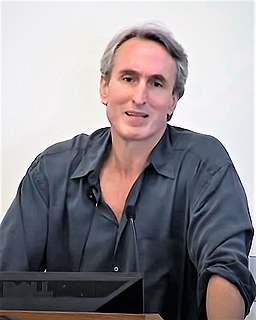A Quote by Jim Wallis
Hope is believing in spite of the evidence, and then watching the evidence change.
Related Quotes
What sets science and the law apart from religion is that nothing is expected to be taken on faith. We're encouraged to ask whether the evidence actually supports what we're being told - or what we grew up believing - and we're allowed to ask whether we're hearing all the evidence or just some small prejudicial part of it. If our beliefs aren't supported by the evidence, then we're encouraged to alter our beliefs.
Hope and optimism are different. Optimism tends to be based on the notion that there's enough evidence out there to believe things are gonna be better, much more rational, deeply secular, whereas hope looks at the evidence and says, "It doesn't look good at all. Doesn't look good at all. Gonna go beyond the evidence to create new possibilities based on visions that become contagious to allow people to engage in heroic actions always against the odds, no guarantee whatsoever." That's hope. I'm a prisoner of hope, though. Gonna die a prisoner of hope.
I was very struck by the fact that Colin Powell said he would produce evidence and then never produced it. Then Tony Blair produced a document of seventy paragraphs, but only the last nine referred to the World Trade Center, and they were not convincing. So we have a little problem here: If they're guilty, where is the evidence? And if we can't hear the evidence, why are we going to war?
I was very struck by the fact that Colin Powell said he would produce evidence of Osama bin Laden fault and then never produced it. Then Tony Blair produced a document of seventy paragraphs, but only the last nine referred to the World Trade Center, and they were not convincing. So we have a little problem here: If they're guilty, where is the evidence? And if we can't hear the evidence, why are we going to war?
Hope is a state of mind independent of the state of the world. If your heart's full of hope, you can be persistent when you can't be optimistic. You can keep the faith despite the evidence, knowing that only in so doing has the evidence any chance of changing. So while I'm not optimistic, I'm always very hopeful.
When you're dealing with a problem as complex as autism, you have to look at it from many different points of view and assemble evidence from many different vantage points. Biological evidence in humans and in animals, toxicologic evidence, how does the body deal with toxins, and evidence looking at the actual experience in populations.



































